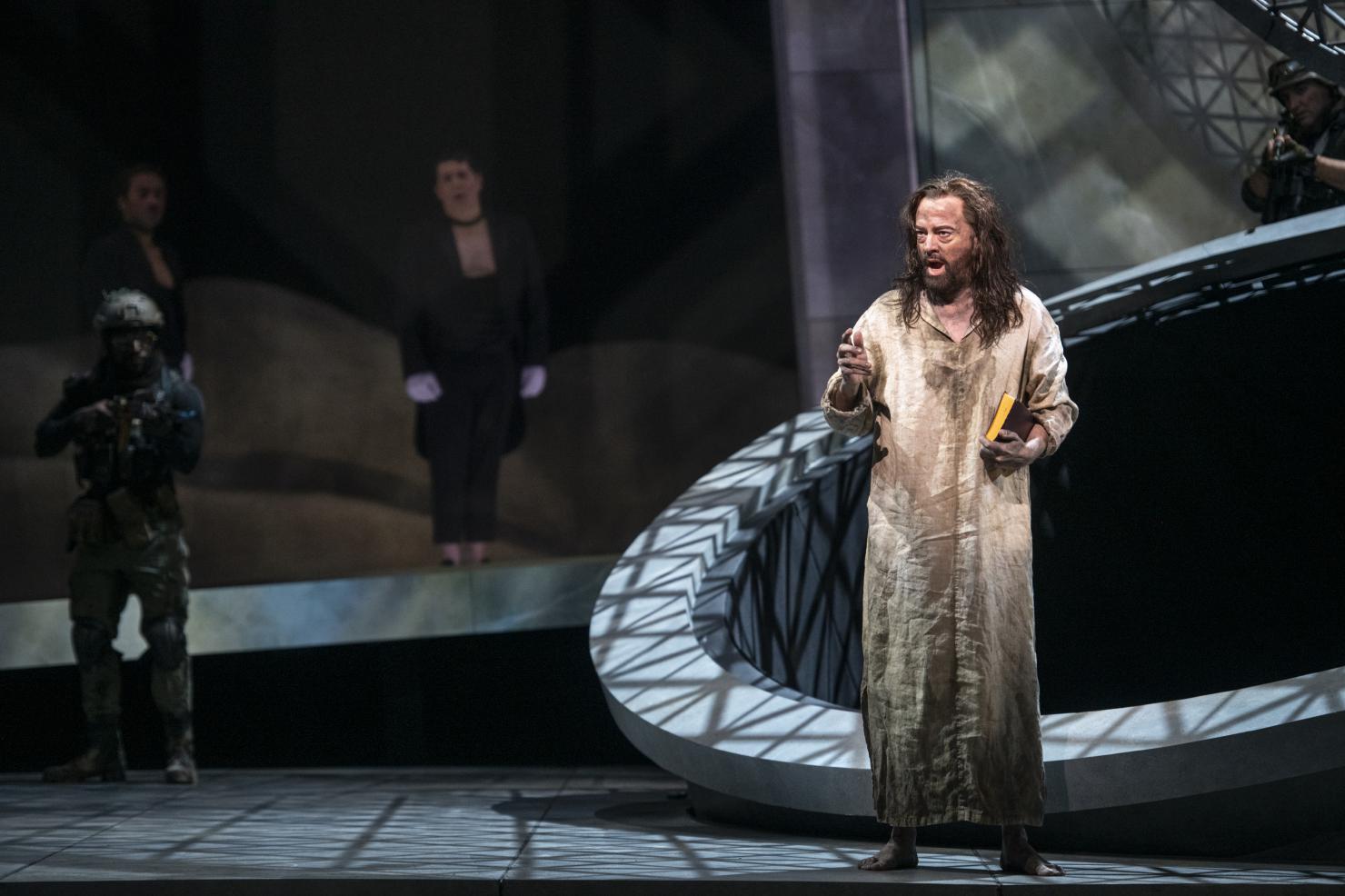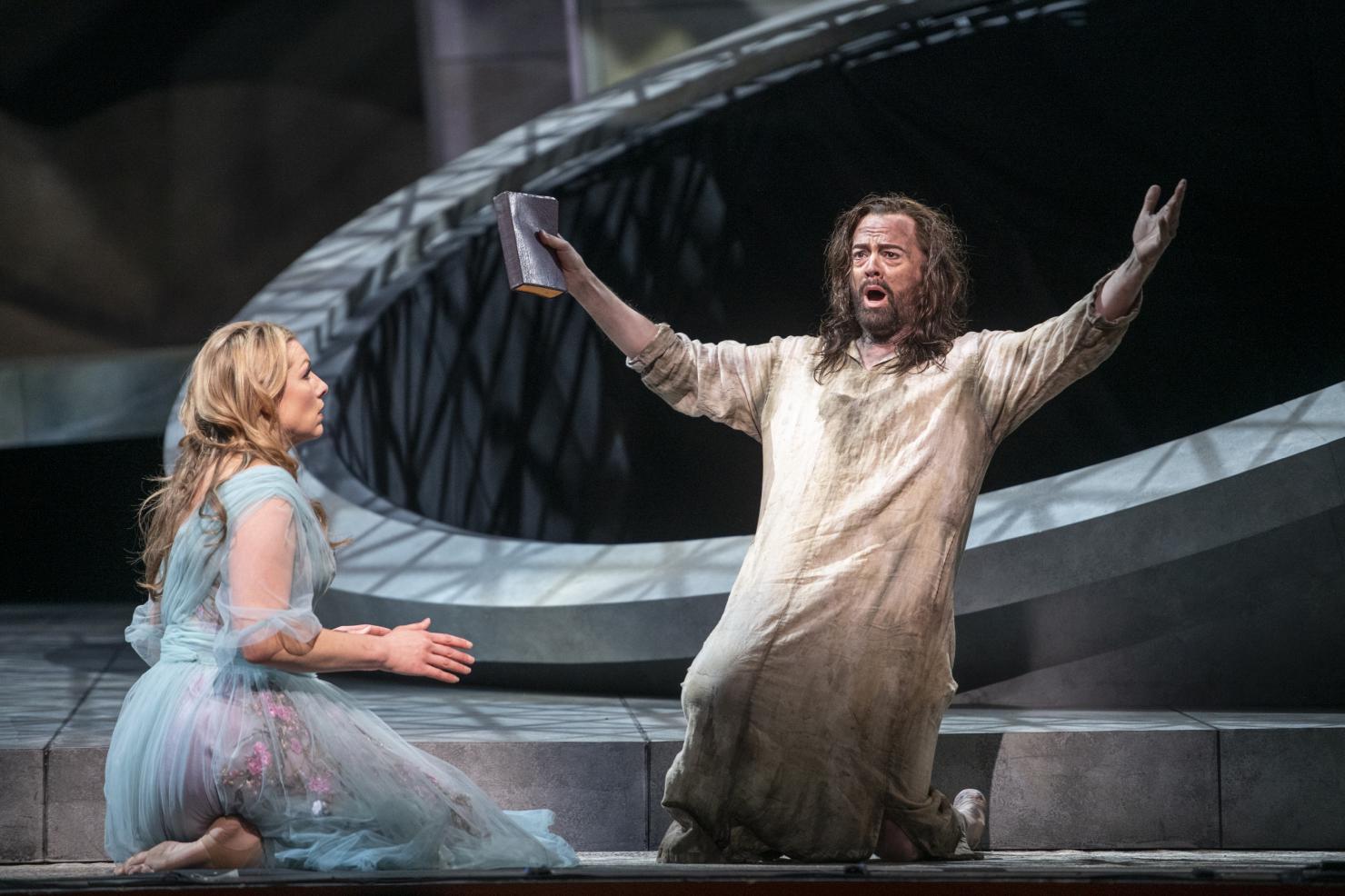
A Love Letter to Jennifer Holloway
ReviewRichard Strauss’s Salome has always been a controversial opera, to say the least. The debut performance in 1905 was not particularly well received, though famously the premiere was attended by Giacomo Puccini, Gustav Mahler, and Adolf Hitler. Based off of Oscar Wilde’s play of the same name, Salome comes from a Biblical tale, though highly erotic and controversially murderous.
In the piece we are introduced to Salome, a teenage princess, daughter to Herodias. Herodias has married King Herod, whose eyes focus too much on Salome for the young girl’s liking. She flees a feast, finding herself admired by Herod’s captain, Narraboth, while she herself is entranced by the voice of Jochanaan, a prophet held captive by Herod. She asks Narraboth to free Jochanaan from the cistern so that she may see him and, smitten with Salome’s beauty, he agrees, ignoring Herod’s standing orders. Freed from the cistern, Jochanaan ignores Salome, prophesying about a woman committing a sinful life who will be condemned to death and killed by soldiers. Eventually, Jochanaan indulges Salome, speaking with her about his faith while the teenager asks to kiss Jochanaan repeatedly. He rebuffs her and, eventually, is returned to the cistern. Narraboth, upset by Salome’s apparent affection for Jochanaan, kills himself.
The other seemingly egregious error came moments before the curtain fell to applause.
Queen Herodias and King Herod enter the fray, arguing as Herodias grows tired of Jochanaan’s prophecies, thinking that he speaks of her. Herod attempts to court his daughter-in-law, who rebuffs him. He asks Salome to dance for him and, after refusing him, she eventually relents under the condition that Herod will give her whatever she would like afterwards. Herod vows the oath and, after sending the crowd away, Salome dances, stripping seven veils from her body in an effort to please Herod. When asked what she wants, Salome asks to be presented with a silver platter, upon it, the bleeding head of Jochanaan. Herod tries to convince her to ask for something else, but she refuses him. Finally he relents and Jochanaan is killed. Salome relishes in the opportunity to finally kiss his mouth and, upon witnessing the princess’s apparent descent into madness, Herod orders her to be killed by his soldiers, fulfilling Jochanaan’s prophecy.

There are many things the director Tomer Zvulun’s new production does right. The set, designed by Erhard Rom, is very grey and, unlike Zvulun’s other grey-washed productions, this fit the scene of the outside of Herod’s palace, complete with a beautiful and ornate cistern with a slanted cage door, which perfectly caught the light when it was lifted. The piece opens in silence as Salome and an ensemble of Salome-dressed blonde dancers seemingly summon an ever-rotating moon from the arch of the proscenium. The dancers perform a dance, seemingly decapitating Narraboth in their entrancement, possibly to foretell the gruesome end to Jochanaan’s life scheduled for later in the evening. The costuming, by Mattie Ullrich, features a mixture of soldier costumes, slightly modern, and stylized dress which seemed to mystify the period in which Zvulun’s production was set. The dancers, choreographed by Amir Levy, were used as an expert interpretation of Salome’s youthful control over men, seducing and entrancing the men at various points of the piece.
On top of the excellent voice, Holloway’s interpretation of a young, tender teenager was believable, thoughtful, and impressive.
Unfortunately, not all of Zvulun’s choices were successful. As Salome is presented with Jochanaan’s head and sings some of the most succulent music for her character, the screen-moon lowered, obscuring a majority of the set.
The moon then disappears, replaced with a picture of Jochanaan’s severed head, which turns and twists into a rose, then a veil rippling in the wind, then an eye, then a star, before finally returning to the moon that we had appreciated throughout the opera. In a final change, the moon turns blood red. These choices were confusing and while there may have been some stylistic interpretation to this choice, it was completely lost. I wanted to watch Salome, whose epic monologue to a severed head, as if it were alive, were enticing. Instead, I watched a giant flower turn into a star, detracting from the artistry a mere ten feet below.
The other seemingly egregious error came moments before the curtain fell to applause. King Herod ran into the sight of his deranged Princess and yelled for the guards to kill her, fulfilling the prophecy that Jochanaan had made. Instead, Zvulun’s production allows Herod to run in, scream “kill her!” and then immediately shoot himself in the head, leaving Herodias and Salome alone onstage, with the latter seemingly alive and no guards in sight to crush her. This rendered the prophecy of Jochanaan… confusing and irresponsibly ignored.
Those incredibly confusing choices aside, Salome we an excessively well produced and well sung production, thoughtfully collaborated by the Atlanta Opera Orchestra and Maestro Arthur Fagan’s impressive conducting and sense of ensemble.
Salome may very well be the highlight of The Atlanta Opera’s season.
Jennifer Holloway leads the cast as the title character. Her impressive instrument was full, technically proficient, and exciting to hear, not to mention vibrant, stunning, and just about every other positive adjective that a standard dictionary could imagine. Her high notes were striking and her lows were just as enthusiastic, leaving a middle that satisfied with creamy legato and warmth that needs to be heard at every house. On top of the excellent voice, Holloway’s interpretation of a young, tender teenager was believable, thoughtful, and impressive. For an adult woman to manage to so easily capture the essence of a mentally ill girl throwing a temper tantrum about a crush, or disgusted by a man, or for her to manipulate Narraboth while still giving him nothing - it was all excellent. Holloway captures Salome perfectly, leading the show triumphantly and creating a believable heroine with an excellent arch of insanity as she descended into apparent madness.

Not to be outdone, international diva and mezzo-soprano superstar, Jennifer Larmore, stepped into the role of Herodias with an accuracy and intellect in her pristine singing and an excellent characterization that, in her stark red dress and high blonde wig, reminded me all too much of a mix between Glen Close’s Cruella de Vil in the 1996 live-action interpretation of Disney’s 101 Dalmations and the most aggressive stage mother I have ever seen.
Countering Ms. Larmore’s performance as her husband, Herod, was Frank van Aken, a tenor of substantial vocal weight and career. His Herod was almost jovial, neurotic, and naive. Nathan Berg’s Jochanaan was portrayed as fragile, tired, and focused, while Berg’s impressive bass was a booming reminder of the prophet’s purpose. Starting the show, Adam Diegel sang an exquisite Narraboth, naive and lovestruck, while second year studio artist, Elizabeth Sarian, served as The Page, almost a prophet in her own right. Sarian’s voice is warm, even, and clear, with a dark chocolatey timbre and excellent dramatic timing that elevated the small role perfectly.
Rounding out the cast were Atlanta resident, Mitch Gindlesperger and first year studio artist Isaac Kim, who sang the roles of First Soldier and Second Soldier, respectively, with great skill, Julius Ahn, Brian Frutiger, Atlanta resident, Nathan Munson, former studio artist Justin Stolz, and former studio artist Alan Higgs taking on the highly difficult and complex roles of the five Jews, showing a clear and creative ensemble that gave each artist a chance to shine. Second year studio artist Jonathan Bryan performed well as the First Nazarene and Philip Cokorinos took on the duty of Second Nazarene and Cappadocian with fortitude.
With a strong cast of singing actors, an incredible orchestra, and an innovative new production, Salome may very well be the highlight of The Atlanta Opera’s season.


Comments